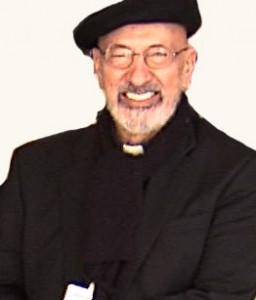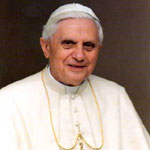The importance of our family in faith, the Communion of Saints….Join Teresa Monag hen, of Pro Sanctity, as she offers a “Personal Plan for Holinessâ€. Listen along with these short, but beautiful meditations which encourage us tocontinue on our journey as “saints in the makingâ€!
hen, of Pro Sanctity, as she offers a “Personal Plan for Holinessâ€. Listen along with these short, but beautiful meditations which encourage us tocontinue on our journey as “saints in the makingâ€!
[powerpress]
Learn more about Pro Sanctity at www.prosanctity.org
Tags: catholic, catholic podcast, catholic prayer, cathollc spirituality, communion of saints, personal plan, pro sanctity, teresa monaghen
This entry was posted on Tuesday, December 27th, 2011 at 7:38 am
You can follow any responses to this entry through the RSS 2.0 feed.
[powerpress] 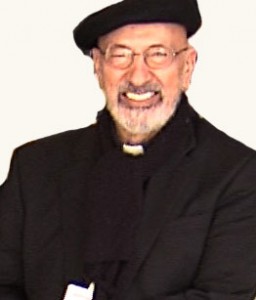 Msgr. Esseff discusses the great love the Blessed Virgin Mary has for all of us. He
Msgr. Esseff discusses the great love the Blessed Virgin Mary has for all of us. He  shares his personal experiences with the Blessed Mother and a special encounter with her love, especially through the gift of her Son. He encourages us to remember that we are never alone.
shares his personal experiences with the Blessed Mother and a special encounter with her love, especially through the gift of her Son. He encourages us to remember that we are never alone.
Tags: alone, blessed mother, blessed virgin mary, catholic, catholic podcast, catholic prayer, cathollc spirituality, John Esseff, love, msgr. john esseff, personal experiences
This entry was posted on Thursday, December 22nd, 2011 at 9:14 am
You can follow any responses to this entry through the RSS 2.0 feed.
Episode 8 – Communion with Christ – Practical Prayer – The “wellsprings” 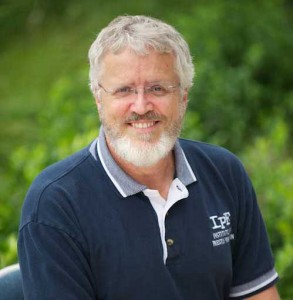  where Christ awaits us.  Responding at the moment when the subtle interior movements of the Holy Spirit calls to us.  The Word of God becomes a place of encounter. The danger of  Scripture  becoming all academic. People are converted when the Word approaches them as living.  The liturgy is also a place of encounter.  The heart as an “altar” in the liturgy.
 where Christ awaits us.  Responding at the moment when the subtle interior movements of the Holy Spirit calls to us.  The Word of God becomes a place of encounter. The danger of  Scripture  becoming all academic. People are converted when the Word approaches them as living.  The liturgy is also a place of encounter.  The heart as an “altar” in the liturgy.
[powerpress]
Deacon James Keating, PhD, the director of Theological Formation for the Institute for Priestly Formation, located at Creighton University, in Omaha.
 From the Catechism of the Catholic Church paragraph 2652 and 2655
From the Catechism of the Catholic Church paragraph 2652 and 2655
2652 The Holy Spirit is the living water “welling up to eternal life”3Â in the heart that prays. It is he who teaches us to accept it at its source: Christ. Indeed in the Christian life there are several wellsprings where Christ awaits us to enable us to drink of the Holy Spirit.
2655 In the sacramental liturgy of the Church, the mission of Christ and of the Holy Spirit proclaims, makes present, and communicates the mystery of salvation, which is continued in the heart that prays. the spiritual writers sometimes compare the heart to an altar. Prayer internalizes and assimilates the liturgy during and after its celebration. Even when it is lived out “in secret,”6Â prayer is always prayer of the Church; it is a communion with the Holy Trinity.7
For more information on the “Institute of Priestly Formation†and for other material available by Deacon Keating, just click here
Don’t forget to pickup a copy of “Communion with Christ†, it is one of the best audio sets on prayer…ever!
Check out Deacon Keating’s “Discerning Heart†page
Tags: catholic, catholic podcast, catholic prayer, cathollc spirituality, creighton university, institute for priestly formation, liturgy, mass, prayer, scripture
This entry was posted on Thursday, December 22nd, 2011 at 7:36 am
You can follow any responses to this entry through the RSS 2.0 feed.
[powerpress]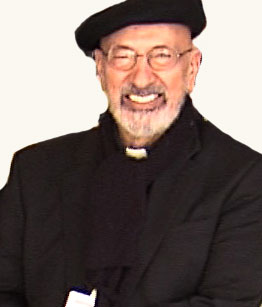 Msgr. Esseff reflects on Mary’s “yes” to the Archangel Gabriel. He also talks about the violent events in Egypt, Syria and other parts of the Middle East, as well as the tragedy of
Msgr. Esseff reflects on Mary’s “yes” to the Archangel Gabriel. He also talks about the violent events in Egypt, Syria and other parts of the Middle East, as well as the tragedy of  the typhoon in the Philippines. He shares his personal experience of being in Peru during the May 1970 earthquake, and how God taught him a very important lesson about how God brings about a greater good.
the typhoon in the Philippines. He shares his personal experience of being in Peru during the May 1970 earthquake, and how God taught him a very important lesson about how God brings about a greater good.
Msgr. Esseff also talks about the importance of doing God’s will…to love in Truth. How do we know what is authentic love? And he offers a teaching on the angels, in particular, the Guardian Angels.
Be sure to visit Msgr. Esseff’s website: Â Building A Kingdom of Love
Tags: blessed virgin may, catholic, catholic podcast, catholic prayer, cathollc spirituality, msgr. john esseff
This entry was posted on Wednesday, December 21st, 2011 at 8:58 am
You can follow any responses to this entry through the RSS 2.0 feed.
Episode 7 – Communion with Christ – Practical Prayer –  The will to pray.  To listen, to search, to see Him…to become prayer ourselves.  You know are progressing by the fruit of your life.  The parish as the “school of prayer”  The pastor as teacher of prayer, the spiritual father.  The disordered demands we may place on the priest.  What is the remedy?
The will to pray. Â To listen, to search, to see Him…to become prayer ourselves. Â You know are progressing by the fruit of your life. Â The parish as the “school of prayer” Â The pastor as teacher of prayer, the spiritual father. Â The disordered demands we may place on the priest. Â What is the remedy?
[powerpress]
Deacon James Keating, PhD, the director of Theological Formation for the Institute for Priestly Formation, located at Creighton University, in Omaha.
 From the Catechism of the Catholic Church paragraph 2650and 2651
From the Catechism of the Catholic Church paragraph 2650and 2651
2650 Prayer cannot be reduced to the spontaneous outpouring of interior impulse: in order to pray, one must have the will to pray. Nor is it enough to know what the Scriptures reveal about prayer: one must also learn how to pray. Through a living transmission (Sacred Tradition) within “the believing and praying Church,”1Â The Holy Spirit teaches the children of God how to pray.
2651 The tradition of Christian prayer is one of the ways in which the tradition of faith takes shape and grows, especially through the contemplation and study of believers who treasure in their hearts the events and words of the economy of salvation, and through their profound grasp of the spiritual realities they experience.2
For more information on the “Institute of Priestly Formation†and for other material available by Deacon Keating, just click here
Don’t forget to pickup a copy of “Communion with Christ†, it is one of the best audio sets on prayer…ever!
Check out Deacon Keating’s “Discerning Heart†page
Tags: catholic, catholic podcast, catholic prayer, cathollc spirituality, creighton university, Deacon Keating, institute for priestly formation, james keating, theological formation
This entry was posted on Saturday, December 17th, 2011 at 8:43 am
You can follow any responses to this entry through the RSS 2.0 feed.
[powerpress]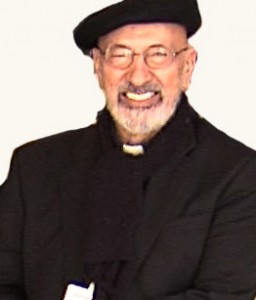
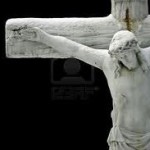 Msgr. Esseff spoke at a recent conference which was held in PA. in November 2011. In the 3rd talk he speaks about sinfulness. Â Â Our mistaken notions and what we should know. What are the traps, what will free us. How confession can bring us into right order.
Msgr. Esseff spoke at a recent conference which was held in PA. in November 2011. In the 3rd talk he speaks about sinfulness. Â Â Our mistaken notions and what we should know. What are the traps, what will free us. How confession can bring us into right order.
Be sure to visit Msgr. Esseff’s website: Â Building A Kingdom of Love
Tags: catholic, catholic podcast, catholic prayer, cathollc spirituality, Esseff, forgiveness, John Esseff, mistaken notions, msgr. john esseff, sin, truth
This entry was posted on Wednesday, December 14th, 2011 at 10:28 am
You can follow any responses to this entry through the RSS 2.0 feed.
VATICAN CITY, 14 DEC 2011 (VIS) –
In his general audience this morning, the Holy Father dedicated his catechesis to Jesus’ prayer in the context of His healing miracles, focusing particularly on the healing of the deaf man as narrated in the Gospel of St. Mark, and the raising of Lazarus.
The healing of the deaf man “demonstrates that the cures worked by Jesus were connected with the intensity of His relationships, both with others and with the Father”, the Pope said. “With a gesture the Lord touches the sick man’s ears and tongue; that is, the sites of his infirmity. … But the central point of the episode lies in the fact that Jesus, at the very moment He works the cure, directly seeks
His relationship with the Father”, by looking up to heaven. “The narrative shows, then, that human involvement with the sick man led Jesus into prayer. His unique relationship with the Father emerges once again, His identity as Only-begotten Son. In Him, through His person, the healing and beneficial action of God is made present among us”.
The raising of Lazarus also highlights this aspect of Jesus’ dual relationships, His concern for a suffering friend and His filial bond with the Father. “His sincere affection for His friend … is expressed by the fact that Jesus was deeply moved at the sight of the suffering of Martha and Mary, and of all Lazarus’ friends, and in His profoundly human tears as he approaches the grave”, the Pope explained. At the same time, Christ interprets His friend’s death “in relation to His own identity and mission, and the glorification awaiting Him. When He hears news of Lazarus sickness, He says: ‘this illness does not lead to death: rather it is for God’s glory, so that the Son of God may be glorified through it'”.
“The moment when Jesus prays directly to the Father before the tomb is the natural climax of the entire episode”. According to John the Evangelist “Jesus looked upward and said, Father I thank you for having heard me”. This phrase, Benedict XVI explained, “shows us that Jesus had not for a moment ceased His prayer for Lazarus’ life. That prayer was continuous, indeed it strengthened Jesus’ bond with His friend and, at the same time, confirmed His decision to remain in communion with the will of the Father, with His plan of love in which the sickness and death of Lazarus is the place in which the glory of God is made manifest”.
Trusting in God’s will
These episodes, said the Holy Father, help us to understand “that when we ask the Lord for something in prayer, we must not expect an immediate fulfilment of our requests, of our will; rather, we should entrust outsides to the will of the Father, reading events in the perspective of His glory, of His plan of love which is often a mystery to our eyes. Thus in our prayer, request, praise and thanksgiving should fuse together, even when it seems to us that God does not respond to our expectations. Abandoning ourselves to the love of God, which always precedes and accompanies us, is a fundamental principle in our dialogue with Him. … Beyond anything that God may give us when we invoke Him, the greatest gift He can give us is His friendship, His presence, His love”. The
giver is more precious than the gift.
“The concern Jesus, true God and true man, feels for others, especially the needy and suffering, … causes Him to turn to the Father. … But the opposite is also true: communion with the Father, constant dialogue with Him, causes Jesus to be attentive to the real-life situations of man, to which He brings the consolation and love of God”.
This profound bond between love for God and love for others must, the Pope concluded, also be part of our own prayers, which “open the door to God, teaching us how to abandon our own selves in order to come close to others, especially in moments of trial, bringing them consolation, hope and light”.
At the end of his catechesis the Holy Father spoke in various languages to greet the more than 7,000 pilgrims gathered in the Paul VI Hall. He expressed his particular appreciation to the people who had contributed to the restoration of the sculpture of “The Resurrection” by Pericle Fazzini, which adorns the Hall. “Following a period of painstaking efforts”, he said, “today we have the joy of being able to admire this work of art and faith in all its original splendour”.
Speaking then in Spanish, Benedict XVI addressed a delegation from the Mexican state of Puebla, expressing the hope that, “with God’s help, I will soon be able to visit you in your country”.
Tags: catholic, catholic podcast, catholic prayer, cathollc spirituality, pope benedict xvi, prayer
This entry was posted on Wednesday, December 14th, 2011 at 7:42 am
You can follow any responses to this entry through the RSS 2.0 feed.
Episode 6- Communion with Christ – Practical Prayer –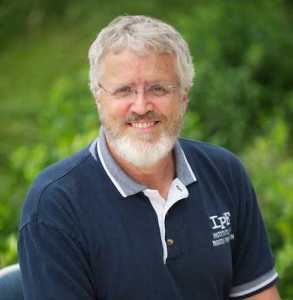 How we receive prayer.  The reception of grace and the great gift of memory. “Ask…seek…knock “.  Through prayer, heaven begins. Prayer is a battle…it isn’t easy.  Western culture is a “culture of distraction”.  We need to receive the coming of God when it enlights upon us.
How we receive prayer.  The reception of grace and the great gift of memory. “Ask…seek…knock “.  Through prayer, heaven begins. Prayer is a battle…it isn’t easy.  Western culture is a “culture of distraction”.  We need to receive the coming of God when it enlights upon us.
[powerpress]
Deacon James Keating, PhD, the director of Theological Formation for the Institute for Priestly Formation, located at Creighton University, in Omaha.
 From the Catechism of the Catholic Church paragraph 2610and 2611
From the Catechism of the Catholic Church paragraph 2610and 2611
2610 Just as Jesus prays to the Father and gives thanks before receiving his gifts, so he teaches us filial boldness: “Whatever you ask in prayer, believe that you receive it, and you will.”66Â Such is the power of prayer and of faith that does not doubt: “all things are possible to him who believes.”67Â Jesus is as saddened by the “lack of faith” of his own neighbors and the “little faith” of his own disciples68Â as he is struck with admiration at the great faith of the Roman centurion and the Canaanite woman.69
2611 The prayer of faith consists not only in saying “Lord, Lord,” but in disposing the heart to do the will of the Father.70Â Jesus calls his disciples to bring into their prayer this concern for cooperating with the divine plan.71
2612 In Jesus “the Kingdom of God is at hand.”72Â He calls his hearers to conversion and faith, but also to watchfulness. In prayer the disciple keeps watch, attentive to Him Who Is and Him Who Comes, in memory of his first coming in the lowliness of the flesh, and in the hope of his second coming in glory.73Â In communion with their Master, the disciples’ prayer is a battle; only by keeping watch in prayer can one avoid falling into temptation.74
For more information on the “Institute of Priestly Formation†and for other material available by Deacon Keating, just click here
Don’t forget to pickup a copy of “Communion with Christ†, it is one of the best audio sets on prayer…ever!
Check out Deacon Keating’s “Discerning Heart†page
Tags: catholic, catholic podcast, catholic prayer, cathollc spirituality, creighton university, Deacon James Keating, Deacon Keating, institute for priestly formation, institute of priestly formation, james keating, prayer, theological formation
This entry was posted on Saturday, December 10th, 2011 at 1:43 am
You can follow any responses to this entry through the RSS 2.0 feed.
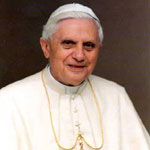 VATICAN CITY, 7 DEC 2911 (VIS) –
VATICAN CITY, 7 DEC 2911 (VIS) –
Benedict XVI dedicated the catechesis of today’s Wednesday audience, celebrated in the Vatican’s Paul VI Hall, to the Messianic Hymn of Jubilee, Jesus’ prayer of praise recorded in the Gospels of Matthew and Luke, which constitutes the “apex of a path of prayer in which Jesus’ profound and intimate communion with the Father in the Holy Spirit and His divine filiation clearly emerges “.
Already at the opening of the hymn, the Pope observed, Jesus addresses God by calling him Father, a term that expresses “Jesus’ awareness and certainty of being ‘the Son’ in close and constant communion with Him. This is the central point and the source of Jesus’ every prayer. … The name of ‘Father’ is followed by a second title: ‘Lord of heaven and earth'”, which “recalls the great biblical narration of the history of God’s love for human beings that began with creation. Jesus … is the pinnacle and the fullness of this history of love. … Through the expression ‘Lord of heaven and earth’ we also recognize how, in Jesus, the one who reveals the Father, the possibility of access to God is opened to humanity”.
But, to whom does the Son want to reveal the mysteries of God? “Divine revelation”, the pontiff explained, “does not occur within earthly logic, according to which humans are the wise and powerful who posses important knowledge and transmit it to those who are more simple. … God’s
style is another: His communication is addressed precisely to the ‘childlike’. … And what is this childlikeness that opens humans to a filial intimacy with God and to welcoming His will? … It is the pureness of heart that allows us to recognize the face of God in Jesus Christ. It is keeping our hearts as simple as those of children, without the presumptions of those who are locked in themselves, thinking they have no need of anyone, not even God”.
“In Matthew’s Gospel, after the Hymn of Jubilee, we encounter one of Jesus’ most moving pleas: ‘Come to me, all you who labor and are burdened, and I will give you rest.’ Jesus asks that we go to Him, the true wisdom, to the one who is ‘meek and humble of heart’; He proposes His ‘yoke’, the path of evangelical wisdom, which is neither a doctrine to learn nor an ethical proposal, but rather a Person to follow: He himself, the only-begotten Son, in perfect communion with the Father”.
“We also can address God with the confidence of sons and daughters”, Benedict XVI concluded, “calling Him Father when we pray. But we have to keep the heart of a child, the heart of those ‘poor in spirit’, in order to recognize that we are not self-sufficient … that we need God, that we have to seek Him, listen to Him, speak to Him. Prayer opens us to receiving the gift of God, His wisdom who is Jesus himself, in order to accept the will of the Father in our lives and to find consolation in the weariness of our journey”.
At the end of the audience, Benedict XVI greeted the pilgrims present in the hall in their various languages and noted that the Solemnity of the Immaculate Conception, which is celebrated tomorrow, “reminds us of Mary’s singular acceptance of God’s salvific plan. Preserved from any stain of sin in order to be the holy dwelling place of the Incarnate Word, she always trusted fully in the Lord”. The Pope especially urged the youth to make the effort to imitate the Virgin “with pure and clean hearts, letting yourselves be shaped by God who, in you as well, desires to bring about ‘great things'”.
Tags: catholic, catholic podcast, catholic prayer, cathollc spirituality, pope benedict xvi, prayer
This entry was posted on Wednesday, December 7th, 2011 at 9:13 am
You can follow any responses to this entry through the RSS 2.0 feed.
 Msgr. Esseff spoke at a recent conference which was held in PA. in November 2011. In the 2nd talk he speaks of our true relationship with the Father in Heaven, the role of the Blessed Virgin Mary, and the 3 levels of the heart and the place of Jesus in our lives.
Msgr. Esseff spoke at a recent conference which was held in PA. in November 2011. In the 2nd talk he speaks of our true relationship with the Father in Heaven, the role of the Blessed Virgin Mary, and the 3 levels of the heart and the place of Jesus in our lives.
Be sure to visit “Building a Kingdom of Love”
Tags: catholic, catholic podcast, catholic prayer, cathollc spirituality, John Esseff, msgr. john esseff, reconciliaiton, relationship, sin, the Blessed Virgin Mary, true relationship
This entry was posted on Tuesday, December 6th, 2011 at 11:14 am
You can follow any responses to this entry through the RSS 2.0 feed.
Episode 5- Communion with Christ – Practical Prayer –  ” How did I ever live without prayer?” 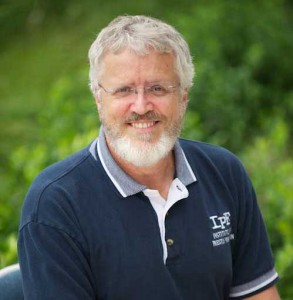  A sustained communion with Christ is the beginning of heaven.  “Ask..seek…knock”.  Are you knocking to receive a relationship or are you knocking to get more stuff?  Are you seeking to surrender and entrust or are you seeking to satisfy more of a passing  desire or mood?  Even in our coming to prayer Jesus wants to purify our motive for doing so.  The challenge of entering into deep prayer which leads to the great maturity of prayer.
 A sustained communion with Christ is the beginning of heaven.  “Ask..seek…knock”.  Are you knocking to receive a relationship or are you knocking to get more stuff?  Are you seeking to surrender and entrust or are you seeking to satisfy more of a passing  desire or mood?  Even in our coming to prayer Jesus wants to purify our motive for doing so.  The challenge of entering into deep prayer which leads to the great maturity of prayer.
[powerpress]
Deacon James Keating, PhD, the director of Theological Formation for the Institute for Priestly Formation, located at Creighton University, in Omaha.
 From the Catechism of the Catholic Church paragraph 2608 and 2609
From the Catechism of the Catholic Church paragraph 2608 and 2609
2608 From the Sermon on the Mount onwards, Jesus insists on conversion of heart: reconciliation with one’s brother before presenting an offering on the altar, love of enemies, and prayer for persecutors, prayer to the Father in secret, not heaping up empty phrases, prayerful forgiveness from the depths of the heart, purity of heart, and seeking the Kingdom before all else.64Â This filial conversion is entirely directed to the Father.
2609 Once committed to conversion, the heart learns to pray in faith. Faith is a filial adherence to God beyond what we feel and understand. It is possible because the beloved Son gives us access to the Father. He can ask us to “seek” and to “knock,” since he himself is the door and the way.65
For more information on the “Institute of Priestly Formation†and for other material available by Deacon Keating, just click here
Don’t forget to pickup a copy of “Communion with Christ†, it is one of the best audio sets on prayer…ever!
Check out Deacon Keating’s “Discerning Heart†page
Tags: catholic, catholic podcast, catholic prayer, cathollc spirituality, creighton university, Deacon Keating, institute for priestly formation, james keating, prayer, prayer Jesus, theological formation
This entry was posted on Thursday, December 1st, 2011 at 6:29 am
You can follow any responses to this entry through the RSS 2.0 feed.
VATICAN CITY, 30 NOV 2011 (VIS) – This morning’s general audience was celebrated in the Paul VI Hall in the presence of 5,500 faithful. Having recently completed a series of catecheses dedicated to prayer in the Old Testament, the Pope today began a new cycle on the subject of the prayer of Christ which, he said, was “like a hidden canal irrigating His life, relationships and actions, and guiding Him with increasing firmness to the total gift of self, in keeping with the loving plan of God the Father”.
One particularly significant moment of prayer followed the Baptism of Jesus in the Jordan. This, the Pope noted, poses a query as to why Jesus, Who was without sin, should have chosen to submit Himself to John’s Baptism of penance and conversion. John the Baptist himself raised the question, saying “I need to be baptised by you, and do you come to me?”. The Holy Father explained how “by emerging Himself in the Jordan River, Jesus … expressed His solidarity with people who recognise their sins, who chose to repent and change their lives. He helps us to understand that being part of the people of God means entering into a new life, a life in conformity with God. By this gesture Jesus anticipated the cross, beginning His active life by taking the place of sinners, bearing the weight of the sin of all humankind on His shoulders”.
By praying after His Baptism, Jesus demonstrates His intimate bond with the Father, “experiencing His paternity and apprehending the demanding beauty of His love. Speaking to God, Jesus receives confirmation of His mission”, with the words that resound from on high: “This is my son, the Beloved” and with the descent of the Holy Spirit upon Him. “Through prayer”, the Pope said, “Jesus lives in uninterrupted contact with the Father in order to achieve His project of love for mankind”. It is in this profound union with the Father that Jesus made the move for the hidden life of Nazareth to His public ministry. (more…)
Tags: catholic, catholic podcast, catholic prayer, cathollc spirituality, pope benedict xvi, prayer
This entry was posted on Wednesday, November 30th, 2011 at 7:49 am
You can follow any responses to this entry through the RSS 2.0 feed.
[powerpress]
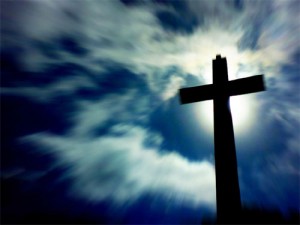
Msgr. Esseff spoke at a recent conference which was held in PA. in November 2011.  In talk #1, he speaks of the true identity of the Christian.  The 3 levels of the person; how others see us, how we see ourselves, how God sees us. The pain and wounds caused by our acceptance of the false identity.  The experience of aloneness and how Jesus redeems. We are being called to the depths in order to raise up the world in Christ Jesus.
Tags: catholic, catholic podcast, catholic prayer, cathollc spirituality, Christ Jesus, false identity, John Esseff, msgr. john esseff, spiritual healing, true identity
This entry was posted on Tuesday, November 29th, 2011 at 5:01 am
You can follow any responses to this entry through the RSS 2.0 feed.
November 19, 2011. (Romereports.com) The pope visited a shelter that welcomes dozens of abandoned children, some of whom are sick or malnourished. It’s called “Peace and Joy,†and it’s run by the Missionaries of Charity in Benin.
Cotonou’s Archbishop and the Mother Superior welcomed the pope, while children sang and danced for Benedict XVI.
Another 800 people, many of them children, waited for the pope in the nearby church of St. Rita. There, the pope talked about the day of his First Communion.
Benedict XVI
“The day of my First Communion was one of the most beautiful days of my life.â€He also said that during Communion, one should be ready to “receive Jesus with love and attention.â€
Talking to others about God is also key, said the pope. He described it as a treasure that should be used generously. The pope then explained to children how he prays.
Benedict XVI
“I can also use the Gospels. That way, I keep within my heart a passage which has touched me and which will guide me throughout the day.â€When it comes to praying, the pope asked them to pray as a family. He also called on children to encourage their parents to pray together as a unit.
Benedict XVI
“Ask your parents to pray with you! Sometimes you may even have to push them a little. But do not hesitate to do so. God is that important.!†ÂThe pope also explained what a rosary is and how to pray it.
At the end of the gathering, the pope gave a rosary to each one of the children.
During the pope’s international trips he usually sets time aside to meet with underprivileged children.
Tags: benedict xvi, catholic, catholic podcast, catholic prayer, cathollc spirituality, pope, pope benedict xvi
This entry was posted on Saturday, November 19th, 2011 at 8:11 pm
You can follow any responses to this entry through the RSS 2.0 feed.
Episode 4- Communion with Christ – Practical Prayer –  Continued reflections on the last things said by Jesus on the Cross.   Mary as teacher of prayer…the wellspring of interiority, because she held all the mysteries in her heart. “I Thirst”….God’s longing for us.  Allowing God to pray in us.  “My God, My God, why have you forsaken me”…is it more that we have abandoned God?  Sin looks like crucifixion.  The final words.
 Mary as teacher of prayer…the wellspring of interiority, because she held all the mysteries in her heart. “I Thirst”….God’s longing for us.  Allowing God to pray in us.  “My God, My God, why have you forsaken me”…is it more that we have abandoned God?  Sin looks like crucifixion.  The final words.
[powerpress]
Deacon James Keating, PhD, the director of Theological Formation for the Institute for Priestly Formation, located at Creighton University, in Omaha.
 From the Catechism of the Catholic Church paragraph 2605
From the Catechism of the Catholic Church paragraph 2605
When the hour had come for him to fulfill the Father’s plan of love, Jesus allows a glimpse of the boundless depth of his filial prayer, not only before he freely delivered himself up (“Abba . . . not my will, but yours.”),53but even in his last words on the Cross, where prayer and the gift of self are but one: “Father, forgive them, for they know not what they do”,54 “Truly, I say to you, today you will be with me in Paradise”,55 “Woman, behold your son” – “Behold your mother”,56 “I thirst.”;57 “My God, My God, why have you forsaken me?”58 “It is finished”;59 “Father, into your hands I commit my spirit!”60 until the “loud cry” as he expires, giving up his spirit.61
For more information on the “Institute of Priestly Formation†and for other material available by Deacon Keating, just click here
Don’t forget to pickup a copy of “Communion with Christ†, it is one of the best audio sets on prayer…ever!
Check out Deacon Keating’s “Discerning Heart†page
Tags: catholic, catholic podcast, catholic prayer, cathollc spirituality, Deacon James Keating, Deacon Keating, institute for priestly formation, prayer, theological formation
This entry was posted on Saturday, November 19th, 2011 at 7:43 pm
You can follow any responses to this entry through the RSS 2.0 feed.



